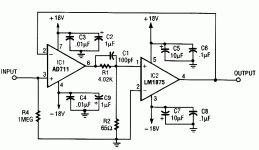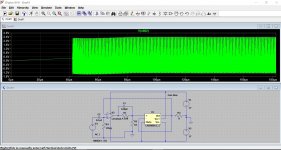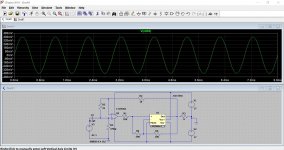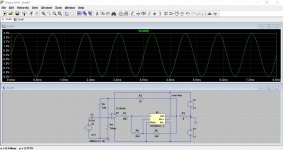I have built the following circuit (with TL072), with a zobel (1ohm and 220nf in series), and when it has a speaker connected (8 ohms) its seems to HF oscillate >10 MHz, sometimes to the degree of square output. On very low input, the oscillation seems to diminish. The oscillation can be seen on the scope, and the heating of the zobel approves it, too. I've tried adding an RC low pass filter (220 ohm, 100 nF) into the feedback-loop, but it actually worsens the situation. What can I do to improve the situation? Maybe running the op-amp on 7812/7912 would help? (Now I run both ICs on +/-17v)
Attachments
I’m no expert in composite amps but here are some thoughts:
This isn’t configured like any of the other composite amps I’ve seen tried. You may be too far off the beaten path.
- multiple stages with one feedback loop will be very sensitive to phase shift in the loop, perhaps an opamp wih more gain bandwidth is necessary
- the LM1875 is stable at gains >10 but this apears to be at unity
- what’s up with the R1 and R2 divider?
This isn’t configured like any of the other composite amps I’ve seen tried. You may be too far off the beaten path.
Each amp is introducing phase shift, the total will usually be more than enough to oscillate unless you compensate or arange that the LF and HF feedback paths are different, keeping HF feedback as local to each stage.
You attempt to add a low pass into the feedback path increased the phase shift even more round the loop!
You attempt to add a low pass into the feedback path increased the phase shift even more round the loop!
The inverting input of the LM1875 is connected to ground. How is that supposed to work?
It just looks all wrong somehow.
If you want to run the LM1875 at unity gain then you have to fool it into thinking its still running at a higher gain by increasing the 'noise gain' of the stage. Look how the feedback is connected in my example.
The output chip is now running at unity gain as far as the signal is concerned.
Wrapping another opamp around it all complicates it yet again and you would have to see how it behaved with real components, however the simulation works OK.
If you want the whole stage to have voltage gain then alter the values and configuration around the opamp as shown in the last image.
It just looks all wrong somehow.
If you want to run the LM1875 at unity gain then you have to fool it into thinking its still running at a higher gain by increasing the 'noise gain' of the stage. Look how the feedback is connected in my example.
The output chip is now running at unity gain as far as the signal is concerned.
Wrapping another opamp around it all complicates it yet again and you would have to see how it behaved with real components, however the simulation works OK.
If you want the whole stage to have voltage gain then alter the values and configuration around the opamp as shown in the last image.
Attachments
- Status
- This old topic is closed. If you want to reopen this topic, contact a moderator using the "Report Post" button.



